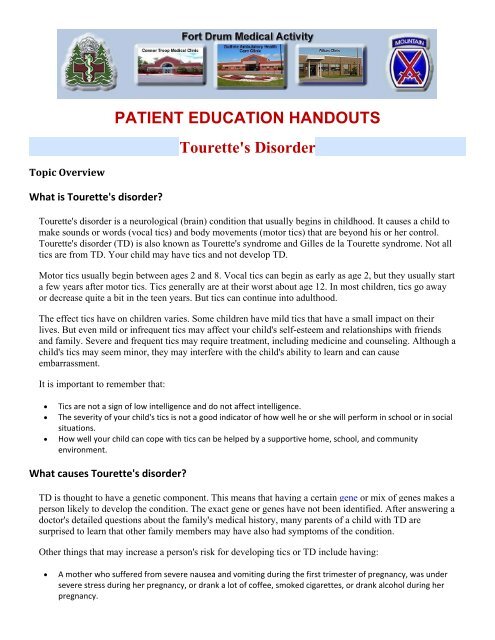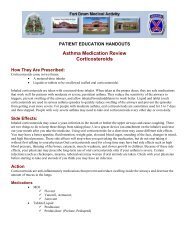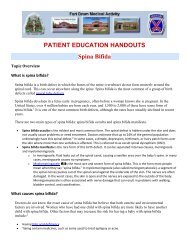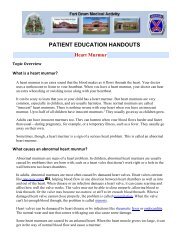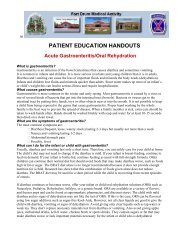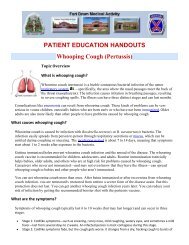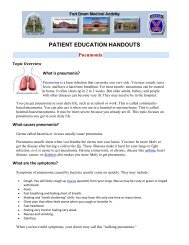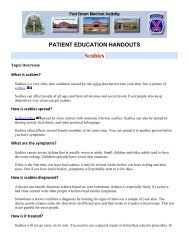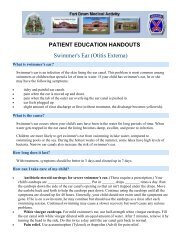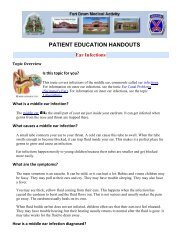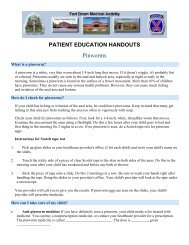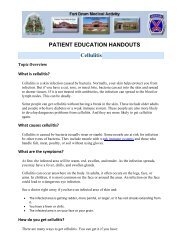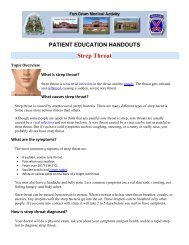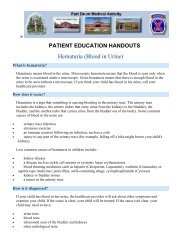PATIENT EDUCATION HANDOUTS Tourette's Disorder
PATIENT EDUCATION HANDOUTS Tourette's Disorder
PATIENT EDUCATION HANDOUTS Tourette's Disorder
You also want an ePaper? Increase the reach of your titles
YUMPU automatically turns print PDFs into web optimized ePapers that Google loves.
<strong>PATIENT</strong> <strong>EDUCATION</strong> <strong>HANDOUTS</strong><strong>Tourette's</strong> <strong>Disorder</strong>Topic OverviewWhat is <strong>Tourette's</strong> disorder?<strong>Tourette's</strong> disorder is a neurological (brain) condition that usually begins in childhood. It causes a child tomake sounds or words (vocal tics) and body movements (motor tics) that are beyond his or her control.<strong>Tourette's</strong> disorder (TD) is also known as <strong>Tourette's</strong> syndrome and Gilles de la Tourette syndrome. Not alltics are from TD. Your child may have tics and not develop TD.Motor tics usually begin between ages 2 and 8. Vocal tics can begin as early as age 2, but they usually starta few years after motor tics. Tics generally are at their worst about age 12. In most children, tics go awayor decrease quite a bit in the teen years. But tics can continue into adulthood.The effect tics have on children varies. Some children have mild tics that have a small impact on theirlives. But even mild or infrequent tics may affect your child's self-esteem and relationships with friendsand family. Severe and frequent tics may require treatment, including medicine and counseling. Although achild's tics may seem minor, they may interfere with the child's ability to learn and can causeembarrassment.It is important to remember that:• Tics are not a sign of low intelligence and do not affect intelligence.• The severity of your child's tics is not a good indicator of how well he or she will perform in school or in socialsituations.• How well your child can cope with tics can be helped by a supportive home, school, and communityenvironment.What causes <strong>Tourette's</strong> disorder?TD is thought to have a genetic component. This means that having a certain gene or mix of genes makes aperson likely to develop the condition. The exact gene or genes have not been identified. After answering adoctor's detailed questions about the family's medical history, many parents of a child with TD aresurprised to learn that other family members may have also had symptoms of the condition.Other things that may increase a person's risk for developing tics or TD include having:• A mother who suffered from severe nausea and vomiting during the first trimester of pregnancy, was undersevere stress during her pregnancy, or drank a lot of coffee, smoked cigarettes, or drank alcohol during herpregnancy.
• Insufficient oxygen or blood supply during birth.• A low birth weight and signs of brain injury or an enlarged section of the brain.• A lower birth weight than an identical twin.• Abnormal evaluation results right after birth (low Apgar scores).• PANDAS. Pediatric autoimmune neuropsychiatric disorders associated with streptococcal infections (PANDAS)can affect tic development. It may make tics worse in children with tics, and it may also cause children who havenot had tics to suddenly develop them. More research is needed to study this process.What are the symptoms?Most children with TD have unique types and patterns of vocal and motor tics. These tics may:• Be a slight twitching of the eyes, jerking of the neck, coughing or throat‐clearing, or a series of movements andsounds.• Occur in bursts of movement (motor) or sounds (vocal). The burst may last from several seconds to severalminutes. Tics may also occur more slowly.• Come and go (wax and wane) over a period of weeks and months and may also change from one type toanother. Your child's tics may get more severe and occur more often, and then gradually get better. Weeks ormonths later, your child may develop a new tic, or an old tic may come back for a while. If your child's symptomsseem to get worse at times, do not assume that you (or your child's school) are doing something wrong.Although things that happen at home and school can have an effect, sometimes tics get worse even when all isgoing well.A common stereotype of people with TD is that they all have uncontrollable outbursts of cursing orobscene or sexual behavior. These types of complex tics are not required for a diagnosis of TD. Eventhough these types of tics may seem routine for TD from what you see on TV and in movies, most childrenand teens with TD do not have these symptoms.How is Tourette’s disorder diagnosed?A doctor can diagnose <strong>Tourette's</strong> disorder based on your child's medical history and the kinds of symptomsyou and other caregivers have noticed. Children may suppress, or hold back, their tics while they're in thedoctor's office, so it may help to bring a videotape that shows your child's tics. But a doctor may diagnoseTD even though he or she has not seen a video or personally observed any tics.Your doctor will want to know whether tics are causing school or social problems for your child. Yourchild may also need psychological testing and testing for learning problems.As with many other conditions, there are no brain tests or blood tests that can prove a person has TD. Butin some cases an electroencephalogram (EEG), a CT scan, or blood tests are done to check for otherconditions.Your child may also be evaluated for ADHD and OCD. These conditions may occur along with <strong>Tourette's</strong>disorder. Also, your doctor may ask whether you have noticed signs of other problems for which yourchild is at increased risk, such as depression or anxiety disorders.How is it treated?Treatment for <strong>Tourette's</strong> disorder focuses on managing tics—helping your child and others cope with thetics. Most cases of TD are mild and will not require medical treatment. Educating yourself, your child, andthose around your child (such as teachers) about TD will help your child thrive, as will creating a
supportive home and school environment where tics are accepted and accommodated.In some cases, such as when other conditions are present, counseling may be helpful. If your child's ticsaffect his or her life significantly, medicines or habit reversal may be considered. The tics can bedecreased, but there is no cure for TD at this time.Frequently asked questionsLearning about <strong>Tourette's</strong> disorder:Being diagnosed:Getting treatment:Living with <strong>Tourette's</strong> disorder:• What is <strong>Tourette's</strong> disorder?• Are there other tic disorders?• What are the symptoms of <strong>Tourette's</strong> disorder?• Who is affected?• How is <strong>Tourette's</strong> disorder diagnosed?• How is it treated?• What can I do at home to help manage <strong>Tourette's</strong> disorder?Author: Debby Golonka, MPH Last Updated: September 27, 2007Medical Review: Michael J. Sexton, MD ‐ PediatricsKarin M. Lindholm, DO ‐ NeurologyReviewed 9 June 2008


